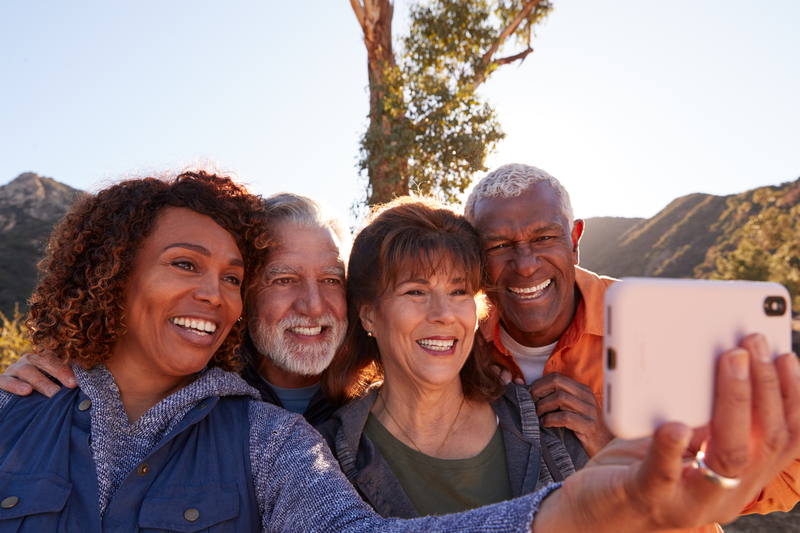Bust Through Aging Myths—You’re Only As Old As You Think

Don’t believe the aging myths you hear. You can be fit, healthy, and vibrant well into your golden years. Your attitude, habits, and lifestyle will play a big role in what your “old” looks like. It’s true: You’re really only as old as you think (and act) you are. Take a look at some of these popular aging myths and discover the truth with these Golden Rules about your Golden Years.
Myth: Learning and Memory Fade with Age
Your memory isn’t what it used to be, so you might as well not try to learn anything new. The older you get, the less you’ll be able to learn.
Truth: You Can Continue to Learn Throughout Life
Learning should be a never-ending process. In fact, the more you strive to learn, the better off you’ll be. Your brain thrives on the challenge of learning new things. Memory and aging may have gotten a bad rap years ago when Sigmund Freud, a renowned psychologist, stated in his book On Psychotherapy, “About the age of 50, the elasticity of the mental processes upon which treatment depends, is, as a rule, lacking. Old people are no longer educable.” In doing so, he may have cast a shadow on the mindset of those who are beginning to advance in years.
The truth is, you can (and should) continue to challenge your brain with new ideas and activities as long as you live. Science shows that cognitive decline is not a definite but rather a choice. By maintaining your interest in life and learning, you are able to keep brain plasticity optimal.
Challenging your brain through continuous learning keeps your brain active and engaged. By continuing to educate yourself, you force your brain to create new neural pathways for learning and memory. Try some of these fun activities to blast away those aging myths:
- Explore new hobbies—trying new things will get you out of your comfort zone where your brain can expand, thereby enhancing memory function.
- Enjoy games—stimulating word games, numbers games, puzzles, and even video games are not only fun but will also help spark cognitive juices.
- Read books—this is always a great way to explore new frontiers and learn about all kinds of varied topics from the comfort of your favorite armchair.
Myth: You’ll Gain Weight
You hear it all the time how once you’re “past 30,” “over the hill,” “of a certain age,” or “older,” your metabolism is going to slow waaay down, and you’ll gain a bunch of weight. You might as well just give up now and not even try.
Truth: You Don’t Have to Gain Weight
Don’t believe this aging myth! Yes, your metabolism may not be poppin’ like when you were a teen, but that’s not a hall pass to blame the gain on getting older. Nope. Instead, why not keep an eye on your food and drink intake and make sure you’re giving yourself what you need for a healthy and vital body?
What can you do?
- Use the “calories in versus calories out” principle—use an online calorie calculator to estimate the calories your body needs to maintain your weight (maintenance calories or TDEE “total daily energy expenditure”).
- Monitor your food intake—there are a lot of great apps that will help give you an idea of how many calories you’re getting on a daily basis. Use these to keep track so you have a general idea of what your food intake looks like. You can also use your hand to easily monitor your serving sizes.
- On average, make sure the calories you eat do not exceed the calories you burn each day—it’s not much more complicated than that. Just monitor what’s going in versus the energy you’re putting out. Look at your trends over time, and if you’re gaining fat weight, cut back on the calories a bit until you level out. Or, increase the amount of exercise or activity you do.
Myth: Exercise Is Dangerous When You Get Older
Be careful and don’t do too much! Older people shouldn’t try to exercise because they could get hurt.
Truth: Exercise Is Essential as You Get Older
Keep on moving! The truth about exercise is that it should be a lifelong activity. Every age can benefit from cardiovascular exercise as well as regular resistance training.
What should you do?
- Stay active—even something as simple as getting in 8,000 to 10,000 steps a day will go a long way toward staying healthy and fit as you age. And with all the apps and wearable fitness devices available today, keeping track is easy.
- Include resistance training—you lose muscle mass as you age unless you do something to halt and reverse that process. Work out with weights a minimum of two to three times per week to not just get stronger but to live longer.

Myth: You Need Less Sleep
As you get older, you need less sleep.
Truth: You Need Seven to Eight Hours of Sleep a Night
You can bust that aging myth right now, as older adults need seven to nine hours of sleep a night, just like their younger counterparts. Do they always get it? Well, no. Often, medications are to blame for sleepless nights, but insomnia often also results from the usual suspects, like taking long afternoon naps, not keeping a regular sleep schedule, or too much stimulation before bed from your electronics like phones, televisions, and tablets.
What can you do?
- Practice good sleep hygiene—and keep your bedroom cool, quiet, and dark.
- Wind down—give yourself time to get into sleep mode by relaxing your body and mind. Maybe try a soothing bath or some nighttime meditations.
- Avoid alcohol and caffeine close to bedtime—besides the fact that you may not want to drink a lot of liquids immediately before bed, these two drinks can really keep the ZZZ’s at bay.

Myth: You’ll Be Lonely and Depressed When You Get Older
Often, television commercials will depict an older person as lonely and depressed, and that has somehow become what we think of when we think about aging.
Truth: You Can Have a Full and Thriving Social Life
Just because you’re older than you were doesn’t mean you are lonely or depressed!
Maintain friendships—stay in touch with friends and family and actively plan for activities and outings together.
Keep up with technology—if you want to expand your social circle, keeping up with the latest technology and gadgets can help. How we communicate has changed over the decades, and if you change along with it, you’ll still be part of the conversation.
Volunteer—if you have some extra time on your hands and you’d like to give back and even make some new friends in the process, why not try volunteering? This feel-good activity will help others and bring you social dividends as well.

Now that you’ve busted the myths about getting older and you’re looking forward to being active and vital throughout your life, what’s the bottom line? Use it or lose it! Don’t stop moving and keep on living in a healthy way. Keep your brain engaged by staying social and interested in life. You can defy those paradigms about aging.






